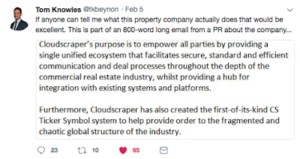Writing the American Marketing & PR Playbook: Part I

Time to read: 3 minutes
Jo Detavernier, vice president of Swyft our US partner and founding firm of our global network, First PR Alliance provides this helpful two part guide for UK tech companies on how not to get lost in translation when venturing across the pond:
Part one UK marketing to US: Common pitfalls
Promoting services and products on the American market looks at first sight very close to how it is done in the UK. Are Americans B2B buyers not comparable to their counterparts across the pond? And are the best means to reach them the same as in the UK? Perhaps surprisingly, the answer to both questions is a resounding ‘NO.’ UK companies need a dedicated American marketing and PR playbook if they want to be successful on the American market.
So in the next two posts we look at what not to do and what to do to crack the US market.
What UK companies do wrong (most of the time)
- Trying to ‘boil the ocean’
Trying to ‘boil the ocean’ is an American expression referring to the trying to accomplish an insurmountable task, or making a project unnecessarily difficult.
Here’s the thing, the American market is simply way too large for any European company to attack all at once, at least not with the kind of budget one normally allocates to attack a single European country (or even Western Europe for that matter).
Omar Mohout, a prominent Belgian professor in Enterprise who teaches at the Solvay Brussels School of Business and Economics, recommends that European companies first target one specific American socio-demographic or geographic segment. For instance, say you developed a SaaS accounting solution perfect for small and mid-sized professional services organizations in the US. You might choose to first target only American law offices in a handful of major metro areas rather than attempt to sell the solution across multiple industries and geographic markets. In other words, figure out how to thrive and be successful in one specific niche, possibly one specific geographic market (for example, the state of Texas). Then you will have something to show when it’s time to convince investors to participate in your next big push to grow market share. Both your organic growth and the extra funding will help make the next chapter in your American expansion story become reality.
- Underfunding the effort
This second mistake is closely related to the first one. Not picking a segment that is small enough for you to thrive in will cause you to underfund your marketing and PR effort. But even the ones that do manage to pick a realistic segment will unfortunately often commit critical budgeting mistakes. For instance, marketing and PR agency costs run higher in the United States than they do in the UK (especially if you are contracting agencies on the West and East Coast). It stands to reason that the cost of any effort aimed at brand awareness and lead generation in one European country is much smaller than attacking the EU as a whole. The same rationale applies to the US, only on a potentially larger scale
The per unit cost of acquiring leads may vary in the US as well, if only because the degree of competition in the tech space is incredibly intense. Even the cost of sponsored posts in national trade websites will cost much more than counterparts in Europe. Google Adwords campaigns are tricky given the competitive nature of many U.S. tech businesses; it’s not uncommon for bidding amounts run so high as to make the ROI on leads untenable. Talking about Google AdWords, is about 13% more in the US than the UK.
What can you do to avoid underfunding your marketing efforts? Aim for what you can reasonably afford — don’t attempt to overreach on market size and in the process underfund the effort. Do plenty of research into your target market and what works and doesn’t work when it comes to marketing and PR. Don’t be shy about reaching out to local agencies for advice. What you learn from them could be the difference between success and failure.
- Not speaking the language
Well we do share a language but speaking the right language doesn’t only pertain to how things are said. It also has to do with the core messages of your marketing campaigns and the manner in which you articulate them. Clearly American culture is very different from UK culture. A simple edit of a brochure or website into American English will not suffice. You have to ‘think’ like an American to attract their attention in an authentic way. Otherwise, you risk alienating your target audience within seconds.
- Picking the wrong channels
You have selected a segment that you want to target, but now the work begins. You will need to select the best mix of channels to achieve your marketing and PR objectives given your budget and target audience. If you are new to the market you will have to spend a majority of your time creating awareness. Don’t forget to track your inbound leads and properly attribute their source (e.g., Twitter ad, Google AdWords campaign, trade show, etc.) in some kind of spreadsheet. Fortunately, many marketing automation platforms (HubSpot, Pardot, etc.) do a reasonably good job at lead attribution. That said, lead attribution will only partially help inform your marcom spending decisions. Take SEA (Search Engine Advertising) for example: For European marketers, SEA equals Google AdWords. But Bing had in January 2018 a 23.7 % share of the American search engine market (source: Statista). While it’s not the largest search engine in terms of search volumes and ad spend, you can’t afford to ignore it in the long run if you hope to pick up market share against your competitors.
Now we know the mistakes to avoid, the next post will look at how UK companies should write their American marketing and PR playbook.
So what makes you the expert??
Time to read: 2 minutes
How can you prove your clients are the zen masters they say they are? We go in search of those elusive proof points.
We know journalists get hundreds of pitches every day. Their mailboxes and twitter feeds are full of companies competing for airtime, all offering informed, relevant comment. But why should a journalist listen to what they have to say?
Your client may be a world expert in their field, whether that’s digital widgets, cloud computing or new legislation.
But if you can’t make them instantly credible in the eyes of the journalist, they’ll go straight to the deleted folder.
Once a client wanted to remove a statistic from our pitch because a) he thought it wasn’t that strong and b) he wasn’t sure it was accurate. We pointed out that, while we understood his concerns, we needed something concrete to show that they were well established, had delivered a lot of great work and hence were worth listening to. We thought the number was convincing, but if it couldn’t be used, it was vital to have an alternative.
One way of gaining credibility is to name high-profile customers. This isn’t easy, unless you can persuade your client to include ‘permission to be named in marketing materials’ in their standard contract (yes this can happen). However, there are creative alternatives. For example, when one customer mentioned that they worked with one-third of the London Boroughs, we didn’t need names – the statistic was enough. Similarly, the phrase ‘working with law enforcement agencies’, as was the case with one Comms Crowd client, speaks for itself.
Demonstrating credibility can be even more difficult in the finance sector, where every ‘expert’ has professional qualifications and offers similar services, and you will have to dig a little deeper. Links to topical issues can help, as can the ability to understand both sides of an issue. We’ve obtained a lot of coverage for one client on the topic of angel investment because not only does he advise clients on obtaining investment, two of those clients have appeared on Dragons’ Den and he also invests as a business angel himself. So he is extremely credible.
Another option is to work with experts whose credibility is a given, such as academics. Hitching your wagon to a star, to quote Ralph Waldo Emerson, can be an effective way of enhancing your own credibility, particularly if your opinions complement those of the expert.
If you’re still struggling for hard facts, the solution may be your client themselves. One of our favourite clients is someone who really ‘gets it’ where journalists are concerned. No matter how busy he is, he’ll quickly give us a short, snappy, often controversial comment to pitch which shows he knows his topic inside out, then makes himself available at short notice if the journalist wants to speak to him. As a result, he punches well above his weight in terms of influence and coverage.
It’s not easy finding proof points and can be even harder to persuade your client to let you make them public. However, it will be time well spent in establishing them as a credible source.
Journalists working with PRs – how to avoid conflict of interests
Time to read: 1 minute
Can a journalist comfortably hang out with PRs ?

Our in house writer and working tech journalist Sandra Vogel explains how it works for her…
There are some who say journalists and PRs are chalk and cheese. They want different things, they see the world in different ways, and it is impossible to work in both camps.
But that’s not true. It is possible to be a freelance journalists who also works with PRs. There can be significant benefits to working in both camps.
On K.I.S.S.ING – Keeping it simple, stupid!
Time to read: 2 minutes
We keep it brief.
We saw this tweet from Tom Knowles a few weeks ago, And it stayed with us. We see this type of thing all the time. Paragraphs beyond paragraphs of long clunky words with no clear explanation as to what it is they are trying to say. You can spend what seems like an age watching a company description going around the various the heads and powers that be of a company. We know this as we’ve worked in-house too. Everyone wants to add their own point of view, something that makes them feel that they played a part in the creation of the copy. But in doing so, adding a long word here and a bit of jargon there, we can completely lose all sense of what we’re trying to say.
When you work for a company you can get so immersed in it and the technicalities around how it works that to come up with a simple sentence to describe what it does exactly can be the hardest thing. We see this a lot in PR too. When we ask a company for 800-1000 word article on a chosen subject its easy. When we ask for a two-sentence reactive comment, it seems to take all day. And it’s the same for us too. For some reason writing less always takes more.
Let’s take the example above with Tom Knowles. Tom is the property reporter at The Times so we can assume that this is a property company (if the PR has got the pitch right!) but what they actually do is anyone’s guess.
Tom’s a busy man. He needs to sift through hundreds if not thousands of emails every day looking for the best news stories all while writing insightful copy for tomorrow’s paper under tight deadlines. He doesn’t have time to read 800 word emails. Tom needs to understand clearly from the outset why this company is great and unique and why it is that he should be speaking to them.
Think about how you read a news article or blog. If you read the first 100 words and you’re either a) not interested or b) you can’t see where it is going, then you are going to switch off and move on to something else. It’s the same with PR pitches. You’ve got to be succinct right from the start and make it very clear why your client is so interesting.
We’ve often questioned if our pitches to journalists can at times be too simplistic. We go back through them trying to add in fancy adjectives and make things sound perhaps more revolutionary than they actually are. What our clients are paying us to do is make sure that the journalist understands why they are so great and why we think it will make a good story. Translating this 800 word description in to two or three easily digestible sentences that get the journalist interested and want to find out more.
So next time you’re thinking about your ‘story’ find the three things that you think make it unique and interesting and express these points high up in your pitch. If you can capture the journalist’s attention in the first two sentences, then that’s half the battle won. If you’re not entirely sure what these key messages are, then it’s time to go back to the drawing board and start the process again.
You don’t need to give the journalist a life story about the company and the 30-year career of the chairman
Keep it brief. If the journalist is interested in the story that you are pitching then they will come back to you with questions. Keep it clear, to the point and highlight why it’s interesting in a couple of short sentences. Keep it simple.
How to get the best out of your virtual agency
Time to read: 2 minutes
OK so she does get out of bed for somewhat less then £10k, but Comms Crowd content writer Sandra Vogel, sets out her terms for keeping us all singing from the same song sheet…
Over the years I’ve been commissioned by some of the biggest names in Tech, national newspapers, and some of the best known technology web sites. I’ve also worked with lots of small companies, mostly but not all with a technology angle, with voluntary organisations, and with communications agencies. I’ve found good and bad clients across the spectrum. It’s not the size or sector that matters – it’s the approach and attitude of the client to using freelancers.The good clients value, support and nurture their freelancers, and in particular they get three very important things right.
Respecting my time. If I say I don’t work Friday afternoons and weekends, although i may make the odd exception, don’t expect me to be free to work as a matter of course. Similarly, if I am set to work for you, say, Mondays and Wednesdays, then if you need to change the day please give me lead time. In return I’ll only change our fixed days if it’s impossible not to, and I’ll give you as much lead time as I possibly can.
Keeping me in the loop. If I’m contracted to work on a specific project, then knowing what’s going on with that project is helpful. Rather than just being asked, ‘please do A, B and C this week’, it can be useful to know how A, B and C fit into the bigger picture and what others are working on. I appreciate that if I’m not in the office full time stuff will happen without me. Of course it will. But it’s useful to be briefed on the bigger picture, not just because it makes me feel like one of the team (it does, it really does), but because I can take wider points into account in my work. Even extra-busy clients that fall into my ‘love to work with’ group manage this.
Paying on time, and at the agreed rate. It should be unnecessary to make this point, but sadly it’s not. Renegotiating rates downwards during a contract or paying late are simply not on. Freelancers are working for a living. They are not volunteers. Trust me, you’ll soon get called out, word will get around. In exchange for paying on time I will deliver on time. And if there’s a chance I’ll be unable to do that, I’ll let you know well in advance.
Now, there’s circularity in this. You treat me well, I’ll treat you well. We’ll have a grown up, professional relationship that we will both enjoy. Heck, I might even work for you on a Friday afternoon. Now and then.
A PR degree – is it REALLY worth it?

Time to read: 2 minutes
As our junior’s three year PR degree draws to an end and the student loan looms large, she asks: Was it really worth it?
Ultimately only time will tell (although I would
like to think YES) as I am yet to graduate and secure a job in the industry.
However, I can still look back on my time studying PR at UAL and pick out the positves and negatives.
Firstly, I do think studying in London brings such an advantage to any student, particularly a PR student, as your University is located on the door step of some of the biggest PR agencies in the UK. Additionally, my Uni has fantastic connections with a variety of PR professionals, with completely differing backgrounds.
Consequently, every week we received a guest lecture from somebody different,
who would provide us with an insight of their experience in the PR industry and
offer advice to those wanting to take a similar path. For me this has been one
of the highlights of my PR degree experience. The talks have opened my eyes to the different paths, sectors and opportunities working in the industry has to offer.
The opportunity the university provides to being exposed to different PR professionals gives you the ability to be proactive and make connections. In
my case, if it wasn’t for Sam being one of my guest lecturers in my second year, I wouldn’t have landed an internship at the tech PR agency Hotwire in the summer of 2017. This then led to me landing my role as a junior for The Comms Crowd.
However, if I am being completely honest, if someone was to say to me do you
think a PR degree is worth it, I would struggle to definitely say yes. This is simply because I feel as though the duration of three years is far too long for the work that you do. In addition to this, obviously this differs depending on where you study, however my course has been primarily theory based. It has been interesting to unveil the theories and history behind PR, although I feel it could be argued whether it is necessary to have this knowledge to succeed in the PR industry.
So although I have obtained a great deal from studying a PR degree, I do feel three years is too long and nor do I believe it is essential if you want to go into the industry. In my experience, PR internships are not too hard to come across, once you
have gained the necessary experience from carrying them out. If you are hard
working, passionate and approachable it is possible to secure a role in PR without a PR degree.
What makes a standout PR candidate?
Time to read: 1 minute
Sam Howard survives another year of crash-course interviews and passes on her observations for what makes a standout PR candidate.
In addition to tending the Comms Crowd, I have an enjoyable side hustle working as associate lecturer leading the Professional Employability module for Westminster Uni. Recently we conducted externally-invigilated panel interviews with every student for a hypothetical intern or junior role depending on their experience in PR, advertising, marketing events etc. There were two panels each panel interviewed 30 students in a day – intense. So you get a very succinct view of qualities that work in interview: Here were the ones that worked best for me:
IMMERSED – Those that could clearly demonstrate a calling for the industry, enjoyed discussing campaigns and liked watching how stories played out in the media. These candidates were able to demonstrate a very proactive choice of careers, almost a vocation and we loved talking to these guys, they were one of us already.
ENGAGED – Those that liked engaging with us were open and seemed to enjoy the process, This really stands you in good stead when so many candidates seem reluctant to even be in the room and the interviewer feels more like a dentist trying desperately to extract information, than a would be employer, .
TUNED IN – Finally those that demonstrated a (quiet) resolve, an innate understanding they had this one moment to convince us that they had the attitude, the attributes, the experience and skills to easily fit in a team and capably do a good job. Those that were successful substantiated passion with knowledge, balanced confidence with credibility, openness with professionalism and demonstrated a positive rationale.They did not get distracted by their nerves, let the occasion overwhelm them, nor lose their way in an effort to become our NBFs, but just resolved to take that opportunity to show us the best of themselves with every answer. In short they had FOCUS.
But if these are not key qualities for you the great comfort of course is most all PR firms don’t rely on interview alone and applicants are given the opportunity to match the talk with the walk, demonstrating their skills and abilities in a variety of tests from proof-reading, pitching, aptitude tests, copy writing etc – and then it of course becomes a very level playing field. Hurrah!
Tips for PR Internship Interviews
Time to read: 2 minutes
Sam Howard interviewed 40 PR undergrads in a day, here’s her top tips for standing out from the crowd.

pick me! oh please pick me!
This is what got me, it’s not until you interview 40 potential interns back to back do you realise how important it is to make a mark and stand out, for the right reasons.
Below my top ten tips for delivering a compelling interview:
1) Dress up not down. You’re a student, I know what students look like, show me what you look like as a young professional, help me imagine you in my world. Lads put on a suit, girls tie back the hair, easy on the make-up, everybody make sure the shoes compliment the look and are clean, Oh and take your coat off!
2) Bring in a portfolio and refer to it. Clips, references, college work, certificates etc.
3) Don’t be worried about nerves. We expect you to be nervous and can see through them, just focus on coherent answers that stack up.
4) Be able to answer the question ‘what do we get if we hire you?’ In three words that are true to the core of you. Even if you’re not asked it, have a handle on your personal brand, what it is, what you stand for.
5) If you are studying PR be able to talk about the industry, our issues, our successes, where we are heading, your PR super hero etc.
6) Don’t offer up a single adjective unless you have a story that backs it up. Don’t feel obliged to provide us with skills or qualities that you are unlikely to have at this early stage of your career. If we’re looking for a new CEO we would have advertised for one.
7) Be comfortable with your more humble achievements. The most convincing candidates were those that talked about everyday PR duties, how tricky it was to get coverage when there was no news, to create 10 tweets a day for a fish and chip shop, to get journalists to talk to you – at least that way we know you know what you are letting yourself in for.
8) Don’t be too eager to please, ‘I don’t care where I work who I work for what I do’ isn’t actually that compelling. Moderate your desire to learn with a view of where you’d like to end up.
9) The ability to demonstrate you can own and learn from mistakes is a key character strength not weakness. Be able to be reflective, think about things that have not gone well that were actually down to you not someone else. Why was that, and what did you learn from it?
10) Have a story lined up that lets us see the passion in you the one that lights you up! It doesn’t have to be work related, just something where we can see your natural energy and pride. Good luck, and enjoy the experience!
PR the big question do you phone or email journalists?
Time to read: 2 minutes
To phone or email? That is the dilemma. Here our team shares its experience

Hi is that the City desk? I have a lovely story about a new tractor that can be driven by a sheep dog…
When you work in public relations your relationship with the media is crucial to your performance. You can be as creative as you like but if you don’t generate coverage for your clients, it is pointless.
Having spent many years at various agencies, our team has had to do its fair share of pitching, using phone and email. One key lesson is that every agency has its own attitude towards phone pitching. Some ask for phone pitching experience and put a massive emphasis on one’s ability to pick up the phone and sell in. On the other hand, others, particularly those with journalism experience understand the pressure journalists face and wouldn’t dream of bombarding them with calls. And then there is the individual’s preference – some prefer to get everything detailed on email, while others dread the silence you get from email pitches!
One of our team recalls working as an intern and phoning journalists that she didn’t know from four pages of media lists downloaded from Gorkana. She sometimes wonders how this experience hasn’t left her scarred for life, particularly when the phone is picked up by a weary and aggressive journalist! However, once in a while, there was ‘the match’ that resulted in decent coverage making the whole experience bearable.
Specialising in fintech PR, we talk to the same people all the time and that gives us the advantage of knowing the stories they are interested in, so selling in doesn’t feel like cold calling – but exchange of services. However, even within this niche sector most journalists claim they don’t want to be bothered on the phone.
Taking that on board, we know to be careful with who we are calling, there is more success to be had in placing an article when you know the journalist and have researched and learned all about them, than just hoping for the best.
So who and when do you call?
Taking our own experience and other PR pros that contributed to Sam’s debate on CIPR’s LinkedIn group discussion, we have compiled some steps that can help you establish that ‘phone relationship’ with your journalist.
- Understand journalists are always on a deadline and get to know their deadline. Better yet, plan in advance and look at their editorial calendar for the year ahead.
- What is your story? Does it match their criteria? Nothing annoys journalists more than PRs that pitch the wrong stories. Preparing a few points in advance helps with staying on track!
- Be polite! Ask if they have time to talk to you and keep it brief, just enough for you to be able to gauge their interest. If they show interest, you can follow up if not, be respectful and don’t bother them again.
- Never ever waffle! A hard learnt lesson! Know your story, and exactly what you want to say and why you are calling them and not another journalist.
- Have an email pitch ready to send as soon as you come off the phone. Email will always fill in the details you missed out.
Having said that, it is important to know everyone is different and should be treated accordingly so keep notes and follow through.
How to get a bank to put its name to a story
Time to read: 2 minutes
Throughout her career, Sam Howard has always maintained that providing PR for fintech companies isn’t rocket science, however it is a bit tricky. Not only are you, the PR, the only person in the brain-chain without a PhD or three, which can leave you feeling perma-insecure; but also ‘tis hard to tell good stories if there are no good stories to tell.

Listening banks are great but talking ones are my favourite
Actually no news isn’t good news – but owing to the nature of the deals, it is not unusual for a small or a start-up fintech company to have just a few client signing announcements a year and those signings usually fall into three categories:
- The no comment: you may not mention the bank in anyway shape or form – great thank you sooo much for that one.
- The vanilla bean: you can prepare something but the details are to be so vanilla and that the quote so bland that it’s barely worth the effort.
- The never never: You get the go ahead on the Friday night, write it on a Saturday, it gets signed off by your team on the Sunday and it’s with the bank for approval first thing Monday morning. And there it will stay, stuck in the corporate food chain awaiting sign off forever more, never to be seen again.
Five tips for getting a bank to sign off a press release
Over the years, working for a fintech start-up, then a fintech multi-national and then a fintech PR agency, these are the tactics I have seen work. It’s a bit of a team effort:
- Incentivize your sales people to negotiate press as part of the contract. Cash bonuses for press releases and double again for a case study, seems to work well enough
- Incentivize your bank by giving them a discount in the contract if they agree to do press, get dates.
- During the sales process and the implementation, stay close to your champion in the bank and work directly with them on the story, using them as the spokesperson, and making sure your story shows your champion as the pioneer they truly are.
- Have the release written and ready to go so that it can be slipped under the nose of your happy, happy client the day everything goes live ahead of schedule and under budget.
- Make the release hardworking and insightful tell the story of the partnership between your company and the bank. Do not dwell on what was wrong in the first place, be realistic no bank is going to sign off a story that goes, ‘well it was just chaos here till you guys showed up’. And keep the quotes real and relevant not an unadulterated and shameless plug for your company. This will make it easier to get sign off, and more credible with the journalists, on whom you ultimate depend to publish it.
What if you hit an absolute wall and can’t get the bank to talk no way no how?
Rather than issuing a no name press release, which somewhat reeks of desperation, consider going down the analyst relations route where your client can freely talk about the project and its successes to the industry analysts under the comfort of NDA.

